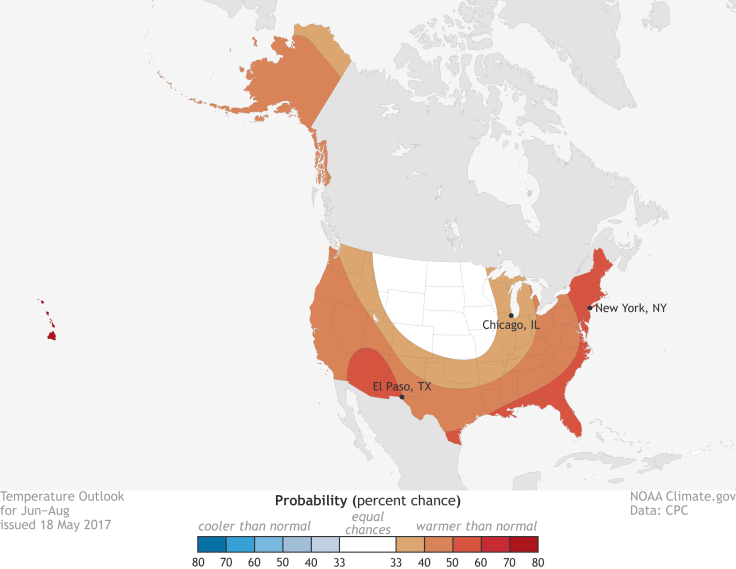Hot Summer? NOAA Report Shows States Likely To See Above Average Temperatures
It’s almost June, meaning summer weather and summer temperatures are approaching fast. Depending on where you are this summer, you may experience temps that are hotter, or cooler, than you’re used to.
The National Oceanic and Atmospheric Administration released its summer outlook to help people across the country prepare for the months ahead. While the first day of summer isn’t until June 21, the heat will likely arrive in some states before then.
Read: Music Festival Tips: 9 Ways To Stay Safe This Summer
A map from NOAA made with data gathered from the Climate Prediction Center shows whether forecasters think it is more, less or equally probable that the summer will be hotter, cooler or normal this summer. But the map just shows predictions, not a guarantee for what's coming.

The color displayed on the map represents whichever outcome is most likely. The orange and red colors represent the greatest chance of temperatures well above average. White represents the chance of temperatures around average. No locations on the map for the summer of 2017 are colored blue, which would herald temperatures well below average.
The Northeast is expected to get hit pretty hard with above average temperatures, so if that’s where you live, you may want to break out the air conditioner. In New York City there’s a 55 percent chance the summer will see temperatures above average, the data show. While Seattle, Los Angeles and El Paso, Texas, all have a 48 percent chance of well above average temperatures.
Read: April Brought Record-Breaking Temperatures Across The US
NOAA is defining “well above” and “well below” as temperatures in the upper or lower third of the climate record that spans 1981 to 2010. As the climate continues to change these conditions will become more common. The extreme heat conditions develop due to temperature, humidity, cloud coverage and wind, and can last days. Prolonged periods of heat can pose a danger to certain people.
Dangers of extreme summer heat:
Between 1999 and 2010, there were more than 7,400 heat-related deaths, data from the Centers for Disease Control and Prevention show. On average, heat causes more deaths per year than floods, hurricanes, tornadoes or lightning combined. So it’s important to be prepared and know the best way to handle extreme heat conditions.
The elderly, very young and those who spend a lot of time outside are at higher risk for potential heat-related illness or death. The CDC recommends staying cool, hydrated and informed about upcoming weather and heat waves. Drinking more water than usual and not waiting until you feel thirsty to have water is key. Staying out of the sun, wearing light colors and taking cool showers and baths can help, but air conditioning is the best solution especially for keeping at-risk people safe.
© Copyright IBTimes 2024. All rights reserved.





















